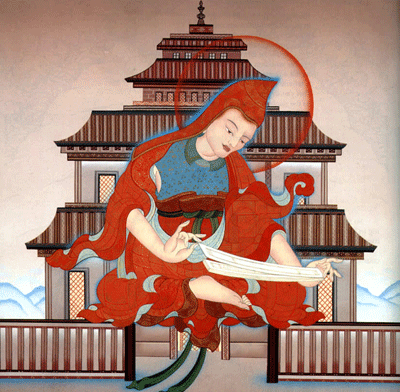
1.a.
Who are endowed with the Dharmakaya,
As well as to their Noble Sons
And to all who are worthy of veneration.
1.b.
vows of the Buddhas’ Sons,
The meaning of which I have condensed in
accordance with the scriptures.
2.
explained before
And I have no skill in the art of rhetoric;
Therefore, lacking any intention to benefit
others,
I write this in order to acquaint it to my mind.
3.
wholesome,
The force of my faith may for a short while
increase because of these (words).
If, however, these (words) are seen by others
Equal in fortune to myself, it may be
meaningful (for them).
4.
find;
And, since they accomplish what is
meaningful for man,
If I do not take advantage of them now,
How will such a perfect opportunity come
about again?
5.
night
For an instant brightly illuminates all,
Likewise in this world, through the might of
Buddha,
A wholesome thought rarely and briefly
appears.
6.
The great strength of evil being extremely
intense,
And except for a Fully Awakening Mind
By what other virtue will it be overcome?
7.
many aeons
Have seen it to be beneficial;
For by it the limitless masses of beings
Will quickly attain the supreme state of bliss.
8.
of (their) conditioned existence,
Those who wish (all beings) to experience a
multitude of joys,
And those who wish to experience much
happiness,
Should never forsake the Awakening Mind.
9.
In those fettered and weak in the jail of cyclic
existence,
They will be named ‘a Son of the Sugatas’,
And will be revered by both men and gods of
the world.
10.
For it transforms the unclean body we have
taken
into the priceless jewel of a Buddha-Form
Therefore firmly seize this Awakening Mind.
11.
the World
Has upon thorough investigation seen its
preciousness,
All beings wishing to be free from worldly
abodes
Should firmly take hold of this precious
Awakening Mind.
12.
For after bearing fruit they simply perish.
But the perennial tree of the Awakening
Mind
Unceasingly bears fruit and thereby
flourishes without end.
13.
greatly afraid
By entrusting myself to this (Awakening
Mind) I shall be swiftly liberated
Even if I have committed extremely
unbearable evils.
Why then do the conscientious not devote
themselves to this?
14.
It instantly consumes all great evil.
Its unfathomable advantages were taught
To the disciple Sudhana by the wise Lord
Maitreya.
15.
Should be understood to be of two types;
The mind that aspires to awaken
And the mind that ventures to do so.
16.
Between aspiring to go and (actually) going.
So the wise understand in turn
The distinction between these two.
17.
existence
From the mind that aspires to awaken,
An uninterrupted flow of merit does not
ensue
As it does with the venturing mind.
18.
mind
With the thought never to turn away
From totally liberating
The infinite forms of life.
19.
Even while asleep or unconcerned.
A force of merit equal to the sky
Will perpetually ensue.
20.
lesser (vehicle),
This was logically asserted
By the Tathagata himself
In The Sutra Requested by Subahu.
21.
Living creatures of merely a headache
Is a beneficial intention
Endowed with infinite goodness,
22.
The wish to dispel their inconceivable
misery,
Wishing every single one of them
To realize boundless good qualities?
23.
Have such a benevolent intention as this?
Do the gods and sages?
Does even Brahma have it?
24.
Even dreamt of such an attitude
For their own sake,
How would it ever arise for the sake of others?
25.
Which does not arise in others even for their
own sake,
Is an extraordinary jewel of the mind,
And its birth is an unprecedented wonder.
26.
Of the goodness of this jewel of the mind,
The panacea that relieves the world of pain
And is the source of all its joy?
27.
Excels venerating the Buddhas,
Then what need to mention striving to make
All beings without exception happy?
28.
They run towards misery itself.
Although wishing to have happiness,
Like an enemy they ignorantly destroy it.
29.
And burdened with many sorrows
It satisfies them with all ioy,
Dispels all suffering,
30.
Where is there a comparable virtue?
Where is there even such a friend?
Where is there merit similar to this?
31.
Is worthy of some praise,
Then what need to mention the Bodhisattva
Who does good without its being asked of
him?
32.
A man who sometimes gives a little, plain
food
Disrespectfully to a few beings,
That satisfies them for only half a day.
33.
who, eternally bestows the peerless bliss of
the Sugatas
Upon limitless numbers of beings,
Thereby fulfilling all their hopes?
34.
evil thought
Against a benefactor such as that Bodhisattva
Will remain in hell for as many aeons
As there were evil thoughts.
35.
regard).
Its fruits will multiply far more than that.
When Bodhisattvas greatly suffer they
generate no negativity,
Instead their virtues naturally increase.
36.
In whom the sacred precious mind is born.
I seek refuge in that source of joy
Who brings to happiness even those who
harm him.
Translated into English by Stephan Bachelor
For the Library of Tibetan Works & Archives,
Dharmshala India




